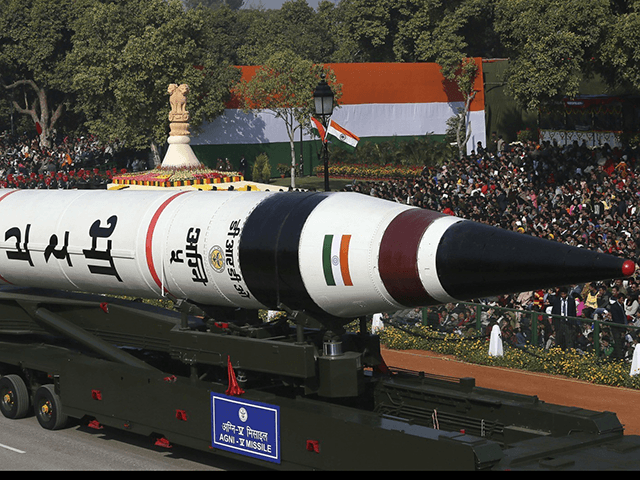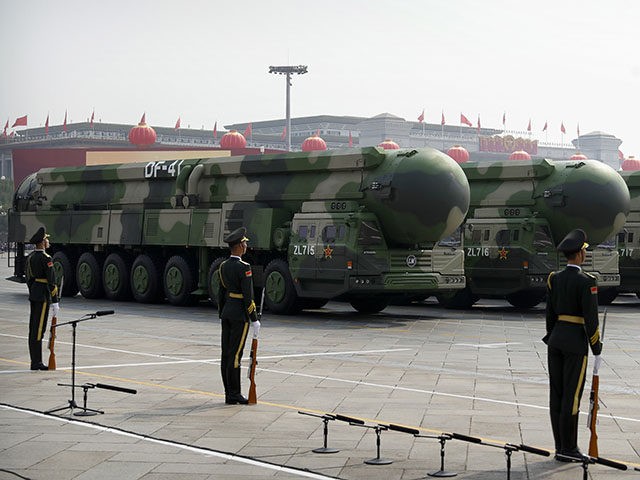A report published by the Stockholm International Peace Research Institute (SIPRI) on Monday said China is pursuing a “substantial expansion” of its nuclear arsenal, including the development of new delivery systems and the construction of hundreds of additional missile silos.
“Several additional nuclear warheads are thought to have been assigned to operational forces in 2021 following the delivery of new mobile launchers and a submarine,” SIPRI said of China’s nuclear development.
The report noted that China’s total inventory of warheads did not increase last year, but “the number of stockpiled warheads potentially available for use has changed because new launchers became operational during 2021.”
The Institutes Yearbook 2022 said that all nine nuclear-armed states “continue to modernize their nuclear arsenals,” although the total number of nuclear weapons “declined slightly” last year – a trend expected to reverse over the next decade.
“All of the nuclear-armed states are increasing or upgrading their arsenals and most are sharpening nuclear rhetoric and the role nuclear weapons play in their military strategies. This is a very worrying trend,” said Wilfred Wan, director of SIPRI’s Weapons of Mass Destruction Program.
The Times of India (TOI) noted on Tuesday that SIPRI’s report dropped the day after Chinese Defense Minister Wei Fenghe boasted of “impressive progress” in developing new nuclear missiles at the Shangri-La Dialogue defense forum in Singapore. Wei said China now has a nuclear-capable inter-continental ballistic missile (ICBM) with a range of over 12,000 kilometers.
TOI cited a Pentagon report that anticipated China doubling its current number of deliverable warheads from 350 to 700 by 2027, and possibly surpassing 1,000 by 2030. The U.S. and Russia each have well over 5,000 nuclear warheads, but China is on track to vault past the United Kingdom and France to become the Number 3 nuclear power.
As for China’s regional rival India, TOI readily acknowledged its determination to “modernize its nuclear arsenal with better delivery systems,” including gravity bombs that can be dropped by fighter jets and ICBMs that could reach most of Asia. However, India still lags far behind on long-range submarine-launched missiles.

The long range ballistic Agni-V missile is displayed during Republic Day parade, in New Delhi, India. (AP Photo/Manish Swarup, File)
The Hindustan Times quoted the SIPRI report to warn that China has developed a significant advantage in solid-fueled mobile missiles that can be relocated easily and launched quickly, making it difficult for adversaries to take out Beijing’s nuclear capabilities with a pre-emptive strike.
The Communist Party’s People’s Daily on Monday published a rapturous report about the latest generation of mobile rocket launchers employed by the People’s Liberation Army (PLA), with footage of a dozen missiles being fired in unison.
James Anderson, who served as President Donald Trump’s Acting Undersecretary of Defense for Policy, told Fox News on Tuesday that China’s growing nuclear arsenal is setting the stage for a dangerous “trilateral situation” in which “the potential for accidents and miscalculations just naturally grows.”
The trilateral situation is dangerous because the Cold War nuclear stalemate involved NATO and the Soviet Union realizing that nuclear war would be a no-win catastrophe for both sides. A third power with equivalent capabilities might see profit in provoking a nuclear exchange between the other two, or might believe it could get away with a limited nuclear strike while the other two powers held each other in check.
Anderson mentioned the “Indian-Chinese rivalry” as a source of concern, since the two nuclear powers have “fought border wars and clashed recently.” Either country could decide to reinforce its position along the contested border with a nuclear threat, and if one pursues that course of action, the other would surely follow.
Voice of America News (VOA) in January quoted analysts who thought China might be pushing full-steam ahead with nuclearization, and loudly boasting of its progress, because it wants to prod other nations to “make deals with Beijing now, while it’s ‘weaker’ and easier to engage.”

COMMENTS
Please let us know if you're having issues with commenting.